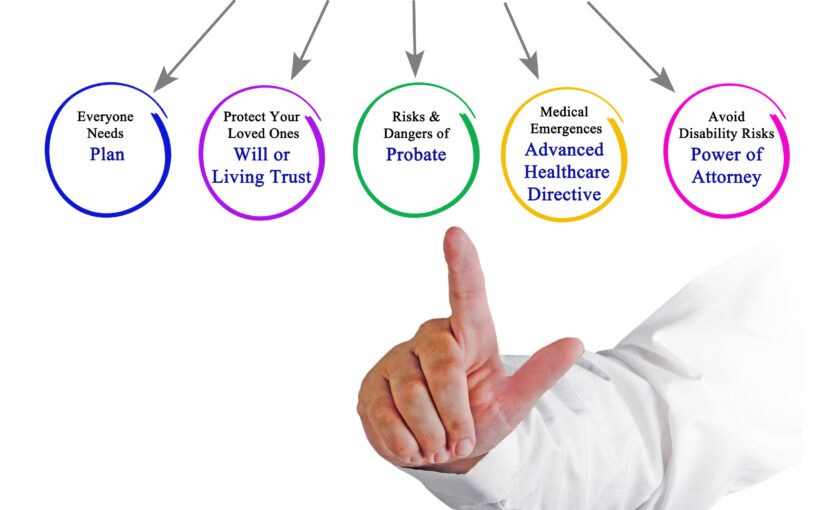
6 Estate Planning Myths
There are common estate planning myths that cause us to put off planning to a later date. People don’t want to think about their death, and for most of their lives, they don’t consider their mortality. However, we have all lost people, and it is always too soon.
When it comes to estate planning, there are several misconceptions. And they can be very costly.
I Don’t Own Enough to Need an Estate Plan
If you have assets that total more than $100,000 in value, your entire estate is subject to Probate Court. Alternatively, a Small Estates Affidavit can distribute an estate with a collective value of less than $100,000.
Probate exists because no one can sign your name. Consequently, if you die with assets in your name, a Probate Court judge appoints an Executor to sign your name and distribute your assets to your beneficiates or heirs.
An agent in a Durable Power of Attorney can sign your name while you are alive. However, that document is revoked by law upon death, so it cannot transfer assets at death.
I Have a Will; My Estate Won’t go into Probate
One of the common estate planning myths is that a Will avoids Probate. All Wills are subject to Probate. A Last Will and Testament is your wish for who receives your estate. If you have a Will and assets in your name, they must go through Probate for distribution. Probate is a long and expensive process, with an average of 18-24 months and thousands of dollars in attorney fees, bond, and filing costs.
I Have Everything in Joint Tenancy
Property titled in more than one name passes to the survivor. However, it is an estate planning myth and a mistake to assume your risk is over. Upon the death of the survivor, the property must go into Probate.
Joint Tenancy is also risky. You should never add a new name to a property title, or allow someone to add your name. Your property would be subject to that person’s liabilities, lawsuits, and claims. Also, if you add someone’s name, other than your spouse, to your property title after the purchase, there could be costly capital gains tax.
Finally, even among spouses, if you hold property title in Joint Tenancy, the survivor may add a new spouse. If your surviving spouse dies before the new spouse, your property will go to the new spouse. And that is not something either of you had in mind right now or ever.
I Am Too Young for an Estate Plan Myth
No matter your age, you are too old not to have an estate plan. Death isn’t something for which we can make an appointment. You know how sudden events can change everything in your line of work. Accidents can and do happen to anyone at any time.
Additionally, you must have an estate plan if you have young children. Naming guardians for your children is one of the most important things you can do. If you do not do so, then the Probate Court decides who gets custody of the kids, and the court controls the money until they are 18. And the kids get everything at 18. Not a good plan.
Living Trusts are Complicated and Expensive
The exact opposite is true.
A Living Trust is an estate plan you manage without restrictions or complications during your lifetime. The Trust then efficiently passes your assets to your chosen beneficiaries after death. If you title your assets in the name of your Living Trust, you avoid Probate. Your Trustee takes care of all distributions to your chosen beneficiaries.
It is essential to know what is fact and what is among the many estate planning myths.
Living Trusts
At the end of your life or incapacitation, they risk Probate if you have property, investments, or bank accounts in your name.
- A Will = Probate. The rule is that no one can legally sign your name. Therefore, all assets in your name are subject to the Probate process, which averages 18 months and is costly.
- A Living Trust avoids Probate.
- Your financial accounts, life insurance policies, and deferred compensation accounts can name your Living Trust as beneficiary, subject to essential tax considerations.
- A Living Trust estate plan includes Health Care and Financial Power of Attorney documents. It also consists of a Last Will and Testament.
- A Will is necessary for the guardianship of your minor children. It also transfers assets in your name out of Probate.
- A Living Trust contains a No Contest provision and beneficiary Asset Protection clauses.
Contact us today for further information or visit Tuohy Law Offices now.
Tom Tuohy

LinkedIn
TomTuohy.com
312-559-8400
17W220 22nd Street, Suite 300
Oakbrook Terrace, Illinois, 60181
This blog entry has been created for information and planning purposes. It is not intended to be, nor should it be substituted for, legal advice, which turns on specific facts and laws in specific jurisdictions. No reader of this blog should act or refrain from acting based on any information included in, or accessible through, this blog without seeking the appropriate legal or other professional advice on the particular facts and circumstances at issue from a lawyer licensed in the reader’s state, country or other appropriate licensing jurisdiction.
Joint Tenancy and its Perils


